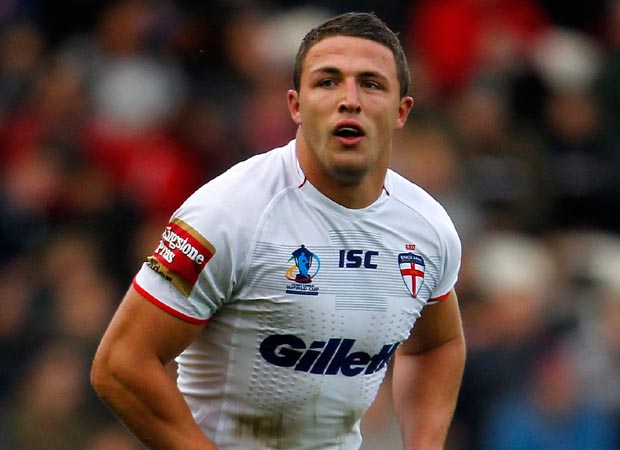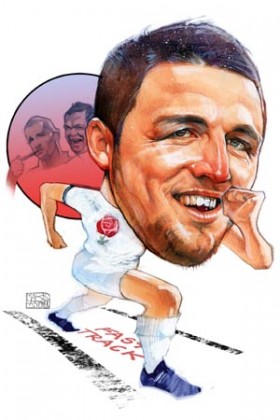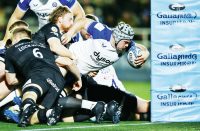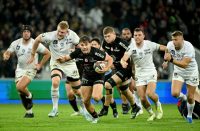
Anyone who says that it is expecting too much for Burgess, the 25-year-old Sydney-based Yorkshireman who is one of Rugby League’s hottest properties, to make the transition to play Rugby Union for England in the World Cup 20 months from now is ignoring one crucial piece of evidence to the contrary: It’s been done already – by New Zealand, albeit on a different time scale.
Williams made a huge contribution to New Zealand’s 2011 World Cup-winning campaign after code-hopping from League for a two-year apprenticeship with Toulon. What makes Williams different from the handful of highly successful cross-coders who preceded him – led by Jason Robinson and Lote Tuqiri – is his transition into a play-making centre rather than a wing or full-back.
‘Slammin Sam’, as Burgess has been dubbed Down Under, is from the same mould as Williams in terms of size, skills and speed, and like any world class player he wants to test himself on the biggest stage – and in international rugby, whether it’s the 13-man or 15-man code, that is the Union World Cup.
Burgess has been steeped in League since his childhood in Leversedge, near Dewsbury, and has become one of the 13-man code’s biggest stars since leaving Bradford Bulls to sign for Russell Crowe’s Australian NRL side, the South Sydney Rabbitohs in 2010.
Of course, there is no guarantee of success. The first hurdle, should the Rabbitohs agree to the £350,000 to £500,000 buy-out of the remainder of Burgess’ contract, is for him to find a Premiership club.
Bath are being touted as his most likely destination, but, if the move is part-funded by the RFU – as was the case with Robinson and Andy Farrell – it will almost certainly mean serious resistance from the other Premiership clubs unless Twickenham delivers a sizeable compensation package.

It has emerged that Stuart Lancaster met Burgess in Australia in August while on a fact-finding trip. England backs coach Farrell is also said to have been instrumental in sounding-out Burgess.
However, Lancaster’s initial reaction to Burgess switching from the NRL to the Premiership was cool. The England head coach warned that Burgess would have to make his case like any other player.
“Given the competitiveness of the squad, any new player coming in would have to earn their right by playing high-quality consistent, top-level Premiership rugby,” Lancaster said.
He added, “Clearly he is a world-class League player, but as with any player who wants to make a transition, it is going to be difficult in a short space of time.”
Lancaster’s caution could be because things have moved much faster on the Burgess front than he or the RFU anticipated, and that he does not want it to distract from England’s Six Nations focus.
There is also, given the way Lancaster inserted Kyle Eastmond’s name into the picture when answering questions about Burgess, a clear desire not to send the message to members of his squad that they are dispensable just because a star turn has arrived on the stage.
Another interpretation is that attitudes within the England squad are a little too precious when it comes to dealing with competition for places. The squad should be a meritocracy first and last, and if Burgess becomes available and can deliver the best results for England at inside-centre then the shirt should be his, irrespective of where he has come from, and how quickly.
It is up to the other inside-centres in the squad, such as Billy Twelvetrees, Luther Burrell and Eastmond, to press their cases – and may the best man win.
Judging from the NRL footage available of Burgess he could be a mighty acquisition. He is not only a very powerful surging runner who breaks the line consistently, he also has soft hands. On top of that he is a brutally strong tackler, although he will have to adapt in defence because some of the high body-check hits that have earned him a fearsome reputation in League will see him carded in Union. However, when he engages his arms he is equally punishing.
With this sort of explosive ammunition my hunch is that Burgess will join Jason Robinson, Sonny Bill Williams, Lote Tuqiri and Israel Folau among the handful of cross-code success stories from League to Union. One advantage is that Farrell could not be better placed to mentor Burgess because he travelled the same route – the only difference being that his switch to England No.12 came at the injury-hit end of his career.
Film star Crowe, who was responsible for signing not only Burgess for the Rabbitohs, but also his elder brother Luke and younger twin brothers George and Tom, has made no secret of his admiration for the leader of the clan.
In a documentary titled Slammin Sam, with Crowe narrating, he pays tribute to the way Burgess combined his early career with nursing his late father, George, through the terminal stages of motor neurone disease.
In the process, the star of Gladiator focuses on how much Burgess, with his unshakeable drive and will to win, means to his club: “The Americans call them ‘a franchise player’ – the one who inspires others…you find a player who has those attributes and you can build a dynasty.”
However, the soundings from Down Under are that the actor will not stand in his way if he decides to make the move.
There is still a long way to go in terms of contractual box-ticking before Sam Burgess crosses the great divide, but there is little doubt that – should this move come off – he has the credentials to become the next big thing in English rugby.























